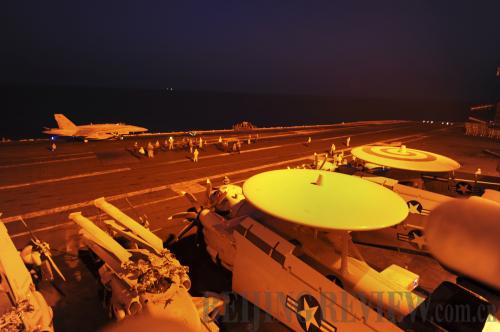|
 |
|
IN ACTION: A press photo released by the U.S. Navy shows an F/A-18C Hornet prepared to launch from the flight deck of the aircraft carrier George H.W. Bush to participate in airstrikes on Islamic State militants in Syria on September 23 (XINHUA/AFP) |
Nearly two weeks after U.S. President Barack Obama declared his latest strategy for tackling Islamic State (IS) militants in Iraq and Syria, the first round of airstrikes on targets in Syria finally came on September 23.
U.S. military forces and partner nations undertook military actions against IS forces in Syria overnight, according to a statement released by the U.S. Central Command. It said that the targets included IS fighters, training compounds, headquarters, command and control facilities, storage facilities, a finance center, supply trucks and armed vehicles. At present, about two thirds of the estimated 30,000 IS fighters are based in Syria.
In his statement on September 10, Obama said that he had authorized military actions in large areas occupied by IS militants in Iraq and Syria, in addition to offering aid to moderate Syrian rebels. The statement revealed that U.S. jet fighters will carry out actions against IS in the territorial airspace of Syria, a country that the United States had long threatened intervention in over its civil war between Bashar al-Assad's regime and rebels since 2011. However, Obama ruled out the possibility of a U.S. ground operation against IS.
A week later, the U.S. Congress approved Obama's $500-million plan to train and arm the moderate Syrian opposition taking on IS. The training program will be implemented outside Syria.
Obama's new strategy also includes calling on an international coalition of 40 countries to confront the Islamic extremist militant group and make more counter-terror efforts to cut off the group's funding and help stem the flow of fighters into the Middle East.
Not a cure-all
Obama's anti-IS strategy has acquired the necessary support from the U.S. Congress despite typical opposition to Obama's plans by the Republican-controlled House of Representatives.
The United States takes IS as a serious global threat, even though Obama has been entangled by partisan arguments as the mid-term election of the House of Representatives approaches, said Li Wei, a research fellow of counter-terror studies at the Beijing-based China Institutes of Contemporary International Relations (CICIR), in an interview with Beijing Review.
The Obama administration did not make an immediate response when IS first swept many cities and towns in Syria and Iraq and committed war crimes against captives and civilians. The United States has been implementing a retrenched global strategy on counter-terrorism since Osama bin Laden was shot dead by U.S. task forces in Pakistan 2011.
But Obama soon realized that IS represents a clear threat to U.S. interests in Iraq as its militants smashed the army of Baghdad. In the past month, IS militants have beheaded three hostages—two American and one British—in protest against U.S. airstrikes on its forces in Iraq. If IS were to occupy the entire country, the United States would lose an important position in the Middle East. That is apparently unacceptable to the Obama administration.
"The soaring pressures of domestic public opinion forces Obama to take tough measures to tackle IS," Li said. "However, the new plan shows that there is no big change for Obama's counter-terror policy."
Obama said in his speech that U.S. combat troops will not take part in ground operations in Iraq and Syria. U.S. combat forces have withdrawn from Iraq. The NATO-led International Security Assistance Force is due to finish withdrawing from Afghanistan by the end of 2014. At present, U.S. counter-terror actions in many countries are carried out in the form of air strikes by drones and jet fighters. Anti-terror ground operations mainly rest on local pro-U.S. forces in these countries, such as Afghanistan and Yemen.
"There will be a problem with Obama's new strategy if U.S. military forces only carry out air strikes against IS militants. Air strikes cannot eliminate the militants. The jihad group has strong combat capability and is good at avoiding air strikes," Li said.
He also warned that air strikes would probably lead to bombing innocent civilians, creating more humanitarian disasters.
Even so, it is certain that Obama will not send U.S. combat troops for ground operations against IS, Tian Wenlin, a researcher of Middle East studies with the CICIR, said to The Beijing News, a Beijing-published news daily.
| 